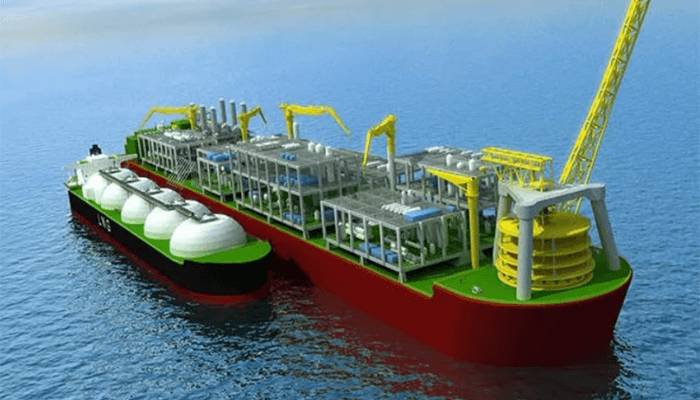Nigeria floating liquefaction specialist UTM Offshore has finalised an vital deal that see the federal government of Delta State becoming a member of state-owned NNPC in buying a major stake in its Yoho Floating Liquefied Pure Fuel (FLNG) challenge which is near being sanctioned.
A closing funding resolution of the 1.5-million-tonne-per-annum FLNG vessel is because of be made in early 2024, assuming the challenge secures the required finance and a deal could be ratified protecting using related gasoline from Yoho.
The challenge fairness has NNPC, UTM Offshore and the Delta State Authorities holding 20 p.c, 72 p.c and eight p.c stakes respectively.
Other than producing over 300,000 metric tonnes of LPG (cooking gasoline) which can be devoted to the home market, the companions mentioned the useful resource can be used to revolutionise the nation’s energy and industrial sectors.
These are issues to find out about an FLNG facility
What’s FLNG?
The FLNG system is a whole facility dealing with the offshore LNG storage, processing and transportation. These big ships use the identical techniques as land-based LNG crops, which implies gasoline could be processed nearer to the supply with out the necessity to order miles of pipeline to deliver the gasoline to the closest facility onshore.
This processing energy opens up large new sources of potential, miles away from shore, that might have beforehand been too tough or costly to take advantage of.
How does FLNG work?
Pure gasoline is extracted from the seabed and transported by pipeline to the close by FLNG. On board, it is going to be handled and liquefied – a course of that includes supercooling the gasoline to -160 levels Celsius to show it right into a liquid.
The liquid gasoline is then saved onboard in storage tanks, till it’s delivered to LNG carriers for transport to therapy crops.
Benefits of LNG
LNG services extract pure gasoline trapped deep underground and over-cooled right into a clear, non-toxic liquid. This reduces its mass by 600 occasions, which implies it may be transported extra simply and safely to gasoline recycling crops world wide. These crops convert it again right into a flamable gasoline, which may then be burned to generate warmth and electrical energy.
Pure gasoline is without doubt one of the cleanest and most secure power sources obtainable at the moment. When burned, it produces half as a lot CO2 as coal and 10 p.c much less air pollution. For this reason, lately, the demand for pure gasoline has elevated dramatically.
In 2000, lower than 100 million tons of LNG per 12 months have been produced and rose to 284 million tons in 2017, in response to NEF Fircroft, an power engineering staffing firm. The rising reliance on gasoline in Asia and Africa has led to a rise in manufacturing within the US, which implies utilization is anticipated to proceed to develop over the subsequent few years.
Native advantages
Sheriff Oborevwori, governor of Delta state mentioned the gasoline wealthy state was significantly within the socio-economic advantages. He famous the anticipated supply of greater than 300,000 tonnes of LPG from the challenge that might go to the home market.
“This challenge may also assist to mitigate the environmental hazards within the Niger Delta by lowering gasoline flaring. After all, our ladies folks may also profit from the gasoline change from kerosene and firewood to cleaner power, thus enhancing their well being and common wellbeing.


